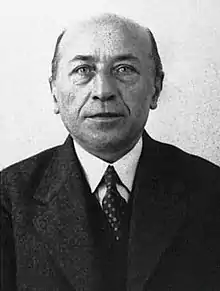Julius Wolff (mathematician)
Julius Wolff (18 April 1882 in Nijmegen – 8 February 1945 in Bergen-Belsen)[1] was a Dutch mathematician, known for the Denjoy–Wolff theorem and for his boundary version of the Schwarz lemma.[3][4][5]
Julius Wolff | |
|---|---|
 Julius Wolff 1882 - 1945 | |
| Born | April 18, 1882 |
| Died | February 8, 1945 (aged 62) |
| Alma mater | Universiteit van Amsterdam |
| Known for | Denjoy–Wolff theorem, boundary version of the Schwarz lemma |
| Spouse(s) | Betsy Gersons (Tilburg 12 Jun 1889 – Bergen-Belsen 9 Mar 1945) |
| Children | Louis (died 11 May 1940 in Amsterdam), Ernst (Groningen 9 Oct 1919 – Bergen-Belsen 3 Mar 1945) |
| Scientific career | |
| Thesis | Dynamen, beschouwd als duale vectoren (1908) |
| Doctoral advisor | Diederik Johannes Korteweg |
Wolff studied mathematics and physics at the University of Amsterdam, where he earned his doctorate in 1908 under Korteweg with thesis Dynamen, beschouwd als duale vectoren.[6] From 1907 to 1917 he taught at secondary and grammar schools in Meppel, Middelburg, and Amsterdam. In 1917 Wolff was appointed Professor of differential calculus, theory of functions and higher algebra at the University of Groningen and in 1922 at the University of Utrecht. He was also a statistical advisor for the life insurance company (or co-operative distributive society) "Eigen Hulp," (a predecessor of AEGON) with offices at The Hague.[7]
Publications
- Wolff, J. (1926), "Sur l'itération des fonctions holomorphes dans une région, et dont les valeurs appartiennent à cette région", C. R. Acad. Sci., Paris, 182: 42–43
- Wolff, J. (1926), "Sur une généralisation d'un théorème de Schwarz", C. R. Acad. Sci., Paris, 182: 918–920
- Wolff, J. (1931). Fourier'sche Reihen, mit Aufgaben. Groningen: P. Noordhoff.[8]
- van Aardenne-Ehrenfest, T.; Wolff, J. (1943–1944). "Über die Grenzen der einfachzusammenhängenden Gebiete". Commentarii Mathematici Helvetici. 16: 321–323.
Gallery
_-_Universiteitsmuseum_Utrecht.png.webp) Julius Wolff, mathematics teacher at Middelburg, 1911
Julius Wolff, mathematics teacher at Middelburg, 1911_-_De_nieuwere_onderzoekingen_op_het_gebied_der_algebra%C3%AFsche_oppervlakken._Rede%252C_Amsterdam_1916.jpg.webp) Wolff: De nieuwe onderzoekingen op het gebied der algebraïsche oppervlakken. Rede, Inaugural lecture, University of Amsterdam 1916
Wolff: De nieuwe onderzoekingen op het gebied der algebraïsche oppervlakken. Rede, Inaugural lecture, University of Amsterdam 1916_-_Complexe_getallenstelsels._Rede_Groningen%252C_1917.jpg.webp) Wolff: Complexe getallenstelsels. Rede, Inaugural lecture, University of Groningen, 1917
Wolff: Complexe getallenstelsels. Rede, Inaugural lecture, University of Groningen, 1917_-_Over_het_subjectieve_in_de_wiskunde._Rede_Utrecht_1922_-_Groningen%252C_1922.jpg.webp) Wolff: Over het subjectieve in de wiskunde. Rede, Inaugural lecture, University of Utrecht 1922
Wolff: Over het subjectieve in de wiskunde. Rede, Inaugural lecture, University of Utrecht 1922 Julius Wolff (rightmost in top row) at the International Congress of Mathematicians, Zürich 1932
Julius Wolff (rightmost in top row) at the International Congress of Mathematicians, Zürich 1932.jpg.webp) Julius Wolff, date unknown
Julius Wolff, date unknown_-_Betsy_Wolff-Gersons_-_Ernst_Wolff_-_Stolpersteine_-_Stadhouderslaan_51%252C_Utrecht_-_2019.jpg.webp) Stolpersteine (messing plates on concrete to commemorate the Jewish victims of the Holocaust) in front of the domicile of Julius Wolff and his family, Stadhouderslaan 51, Utrecht, 2019
Stolpersteine (messing plates on concrete to commemorate the Jewish victims of the Holocaust) in front of the domicile of Julius Wolff and his family, Stadhouderslaan 51, Utrecht, 2019_-_Former_address_-_Stadhouderslaan_51%252C_Utrecht_-_2019.jpg.webp) Address of Julius Wolff and his family, Stadhouderslaan 51, Utrecht, 2019.
Address of Julius Wolff and his family, Stadhouderslaan 51, Utrecht, 2019.
References
- Joods Monument - Julius Wolff
- quoted from Gerard Alberts, Amsterdam, blog post of Feb. 3, 2003 at mathforum.org
- J. A. Barrau (1948). "In Memoriam Prof. Dr. J. Wolff". Nieuw Archief voor Wiskunde. 2 (22): 113–114. with portrait[2]
- J. G. van der Corput (1948). "Wiskunde". In Karel Frederik Proost and Jan Romein (ed.). Geestelijk Nederland 1920-1940 (PDF). II. Amsterdam: Kosmos. pp. 255—291 (263—299 in the pdf file). This article has a separate one-page-section on the importance of J. Wolff (p.279-280 in the pdf file), and a portrait (p.275).[2]
- (J.A. van Maanen:) Julius Wolff (1882-1945) (Biography in Dutch)
- Julius Wolff at the Mathematics Genealogy Project
- Joods Monument - Julius Wolff and his family
- Moore, C. N. (1934). "Review: Fourier'sche Reihen, mit Aufgaben, by J. Wolff". Bull. Amer. Math. Soc. 40 (1): 19–20. doi:10.1090/s0002-9904-1934-05774-4.
| Wikimedia Commons has media related to Julius Wolff (mathematician). |